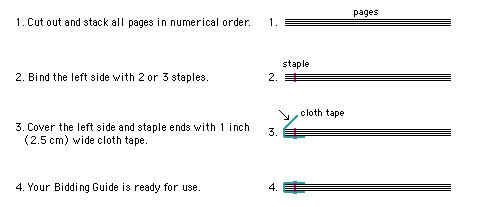Contract Bridge requires quick thinking and decision making. What often appears obvious in hind sight, is not at all clear in the heat of the battle. Mistakes are therefore unavoidable and part of the game, even by the best players.
The better players know that maintaining a friendly atmosphere and providing Partner with moral support when needed, are essential for maintaining good productive communication throughout the play.
Endless post mortems and blaming your Partner (a regrettable habit by some lesser players) are not going to make any difference to the result, and only lead to further deterioration of constructive communication with your Partner.

Therefore at all times be nice to your Partner.
When your Partner makes a mistake he/she will suffer and fret over it much more than you do. It usually also will affect his play negatively for the next few games. Therefore don't rub it in, but immediately put a positive spin on the mishap and try to erase it from Partner's mind.
This will help Partner enormously to get back on a positive track.
Furthermore he/she will be more likely to treat you in the same way, the next time you make a mistake !
In general be graceful in defeat and humble after your victories.
This will enhance the atmosphere at your table enormously. Contract Bridge may be a fiercely competitive sport, but this does not mean it can't still be played as a gentleman's game !
(Down - Up - Top)
BR Intro 5 - Contract Bridge Bidding Guide
I have included three versions of my Contract Bridge Bidding Guide
Assembly
Print out all pages of the Contract Bridge Bidding Guide. Print only on one side of the paper, so that you have plenty of blank spaces in the booklet to write down your own comments and reminders.
Cut the top and bottom edges of each page along the horizontal markers, then stack the pages in numerical order.
Make sure you have sufficient blank space on the left side to allow for stapling.
Now assemble the Bidding Guide as follows.

How to use the Bidding Guide
Use the Bidding Guide for your study, or for checking and reference after you bid and played a deal.
Do not use it during the bidding itself !
Don't be afraid to make mistakes. These will in fact greatly speed up your learning process. Playing it safe by reading all your bids from the book will only hamper the process of you absorbing and learning the bidding principles.
(Down - Up - Top)
BR Intro 6 - Books for further Study
The enormous quantity of Contract Bridge literature available can be rather daunting to the novice bridge player. The following books are, in my opinion, outstanding within their field. They will enhance your bridge skills and add clarity and focus to your overall understanding of the game. (Highly recommended titles are shown in red.)
Bidding Systems
- Standard Bidding (Beginner)
Bridge Basics - An introduction to good bridge - by Ron Klinger
Publ. by Modern Bridge Publications, PO Box 140, Northbridge, NSW Australia
- Acol (Beginner)
Basic Bridge - The Acol System - by Ron Klinger
Publ. by Modern Bridge Publications, PO Box 140, Northbridge, NSW Australia
- Bidding and Play (Newcomer/Intermediate : separate versions for Standard American and for Acol)
Ron Klinger's Guide to Better Bridge - by Ron Klinger
Many "add on" skills to both your bidding and play.
Publ. by Modern Bridge Publications, PO Box 140, Northbridge, NSW Australia
- Losing Trick Count (Intermediate)
The Modern Losing Trick Count - by Ron Klinger, 2009
Publ. by Cassel - Orion Publishing Group ,Orion House, 5 Upper St Martin's Lane, London WC2H 9EA
- Bidding Conventions (Intermediate)
Bridge Conventions, Defences and Countermeasures - by Ron Klinger, 2009
Publ. by Cassel - Orion Publishing Group ,Orion House, 5 Upper St Martin's Lane, London WC2H 9EA
- Bidding Conventions (Newcomer/Intermediate)
25 Bridge Conventions you should know - by Barbara Seagram & Marc Smith, 1999
Publ. by Master Point Press, 331 Douglas Ave, Toronto Ontario Canada
- Bidding Conventions (Newcomer/Intermediate)
25 More Bridge Conventions you should know - by Barbara Seagram & David Bird, 2003
Publ. by Master Point Press, 331 Douglas Ave, Toronto Ontario Canada
- The Banzai Point Count (Intermediate/Advanced)
Better Balanced Bidding - The Banzai Method - by David ("Banzai") Jackson & Ron Klinger, 2010
Publ. by Cassel - Orion Publishing Group ,Orion House, 5 Upper St Martin's Lane, London WC2H 9EA
- Acol - Bidding and Play (Intermediate)
The New Complete Book of Bridge - by Albert Dormer with Ron Klinger, 2010
Publ. by Cassel - Orion Publishing Group ,Orion House, 5 Upper St Martin's Lane, London WC2H 9EA
- Precision (Intermediate)
The Precision System of Bidding - by Charles H. Goren
Publ. by Robert Hale & Co., 63 Old Brompton Road, London, S.W7
- The Power System (Intermediate/Advanced)
The Power System - Five bids to Winning Bridge - by Ron Klinger
Publ. by Modern Bridge Publications, P.O.Box 140, Northbridge, NSW 2063, Australia
Card Play Technique
- Both Declarer Play and Defence (Newcomer/Intermediate)
Card Play Technique - by Victor Mollo & Nico Gardener, 1971
The all time Classic in Contract Bridge literature, and a must read for every serious bridge player.
Publ. by Faber and Faber, 3 Queen Square, London
- Declarer Play (Newcomer/Intermediate)
How to Play Your Cards when You are The Declarer at Contract Bridge - by John Mallon
A systematic approach to Declarer card play techniques with numerous examples and Quizes.
Publ. by Chilton Book Company, Radnor, Pennsylvania USA and by Don Mills, Ontario,
Canada
- Opening Leads (Newcomer/Intermediate)
Opening Leads and Signals in Contract Bridge - by John Mallon
A systematic approach to making superior opening leads with numerous examples and Quizes.
Publ. by Collier Books, Collier MacMillan Publishers, London
- Both Declarer Play and Defence (Intermediate)
Guide to Better Card Play - by Ron Klinger, 2011
Publ. by Cassel - Orion Publishing Group ,Orion House, 5 Upper St Martin's Lane, London WC2H 9EA
Other
-
Duplicate Bridge Direction - a Complete Handbook
- by Alex Groner
With complete scoring instructions and Movement charts for any number of tables.
Publ. by Barclay Bridge Supplies, Inc., Port Chester, NY 10573, USA
-
The Laws of Duplicate Bridge, 2007
- by the World Bridge Federation
Effective from January, 2008.
Publ. by Bridge NZ (2004) Limited, 60-D Woodland Road, Jonsonville, Wellington NZ